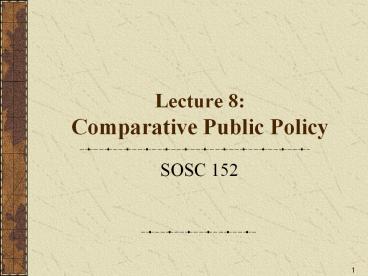Lecture 8: Comparative Public Policy - PowerPoint PPT Presentation
1 / 11
Title:
Lecture 8: Comparative Public Policy
Description:
does policy follows this procedure?: determine the issue (Agenda Setting) ... human rights, school morality, abortion, f. Foreign Policy and National Security ... – PowerPoint PPT presentation
Number of Views:222
Avg rating:3.0/5.0
Title: Lecture 8: Comparative Public Policy
1
Lecture 8 Comparative Public Policy
- SOSC 152
2
- Key Topics
- What is Public Policy?
- Agenda Setting and Non-Decisions
- Understanding the Decision Making Process
- Policy Types and the Policy Process
- Implementation
3
1. What is Public Policy?
- The way government institutions make decisions in
response to public demands and the governments
own interests, - And the way in which the government provides
goods and services to the population. - "Power" as the ability to get someone to do
something, make governments make policy or
ability of government to make decisions and have
them implemented.
4
2. Agenda Setting and Non-Decisions
- A. Agenda Setting, Or How Issues Get on the
Agenda? - For societal demands or issues to become public
policy, they must be discussed by political
leaders. - How do issues get onto the public and political
agenda? - here the role of media, protests, public
participation - B. "Second Face of Power" or How Issues are Kept
Off the Agenda - one can study how important issues DO NOT get
onto the political agenda - look for big problems that do not get discussed
and assume that someone is stopping it from being
discussed. - invisible power, not to make things happen but to
stop things from happening
5
3. Understanding the Decision Making Process
- Who controls how decisions are made? Politicians,
bureaucracies, public opinion? - A. Rational Model of Decision Making
- does policy follows this procedure?
- determine the issue (Agenda Setting)
- what are the core values related to the issue?
What is the long-term goal (equality, growth,
higher moral values for society, etc.) - Assess all possible options, will they help
attain long term goals? - decision
- Implementation
- Evaluation and adjustment
6
- what gets on the agenda is often result of
politics and power - long term goals get lost as people fight over
what policy can attain the goals - important limits of information and time
- decisions may be affected by personalities of
participants - "incrementalism"--best predictor of tomorrow is
today - B. Bureaucratic Politics
- policy decisions as outcome of bureaucratic
conflict or debates among leaders - outcome often result of negotiation and
compromise, not best strategy for attaining long
term goal. - implementation result of "standard operating
procedures - Locus of Decision Making
- outcome affected by where decision is made, who
is invited to the meeting, who is kept out
7
4. Policy Types and the Policy Process
- The types of policies, the extent to which they
transfer resources and how they do it, can affect
the way in which the decision process occurs. - it determines who gets involved, how strongly
they care or will fight about the issue, where it
is decided, the amount of time available to make
the decision, whether the public can get involved - a. Distributive policy roads,
- everybody benefits, public goods
8
- b. Regulatory or Deregulatory Policy airline
industry - controls the actions of some members of society,
setting prices, access to market, rules of
behaviour - China's Open Policy as form of "deregulation" of
links to outside world. - c. Extractive Policy Taxes, Military Service
- must extract goods and services from society
- d. Redistributive Policy
- transfers goods from one group or social class to
another
9
- e. Ideological or Moral Policies
- human rights, school morality, abortion,
- f. Foreign Policy and National Security
- may suddenly come onto the agenda
- often a crisis decision
- time for decision short, limited information
10
5. Implementation
- In developing and socialist states, population
influences public policy only by adjusting the
outcome through the implementation process. - weapons of the weak, undermine implementation
based on local interests, not state interests. - pressures on local politicians to consider local
interests
11
- B. State Strength and Implementation
- states often weak, not strong, because they can't
get policies implemented - problems of policy compliance
- problems of getting good information about degree
of compliance - C. different types of policies face different
problems - ideological easy to have false compliance
- public goods confront "free rider problem"
- redistributive policies lead to major conflicts































